Turkey's Blackbox: Sedat Peker
- Çağan Onataslan

- Jun 15, 2021
- 7 min read
The year was 2012 when me and a few friends (who were under the age of 18 at the time) were in a Shisha café. Suddenly, the manager of the café got a phone call and immediately escorted us and other underage patrons out through a backdoor. He later explained that he got a phone call from one of the henchmen of “Brother Sedat” warning them of an upcoming police raid. This was a trivial event of course, but it was the first time I personally witnessed the widespread corruption, influence of the mafia and their possible networks within the police and the state. The café was on Baghdad Avenue, a seemingly peaceful and elite district of Istanbul but it was also commonly known that Sedat Peker was influential and to open a business there, one needed his approval and needed to pay the fee of his “protection” (which actually meant if one didn’t pay, their business would be targeted by his gang). This was the environment I grew up in, and through the years I knew people who claimed to use Sedat Peker’s influence to sort their affairs with the government. I had friends who went and took pictures with him in order to seem powerful, even people claiming to be his nephew in order to get out of school fights. So as a 14 year old in Istanbul living in Baghdad Avenue, my friends and I grew up hearing urban legends about him. It is now clear that this was a recruitment tool of the mafia. However, this trend within the youth of Turkey was also perpetuated by a society that was becoming more nationalist and populist as people that subscribed to his ideology (at least in my experience) were that either people with more nationalist/far-right tendencies or people that were looking to exploit these connections. Mafias in general use populist rhetoric both as a recruitment tool as well as a public relations instrument because it provides them a justification for their illegal activities in the eyes of the public.
SEDAT THE ROWDY
Sedat Peker burst into Turkish public life in the early 90’s, before that he had a troubled youth. He went to prison at the age of 17 for assault and his experiences in and after prison resulted in him amassing a small following. This gradually evolved into an organized crime operation. This caused him to be introduced to the public as he started making TV appearances. His rhetoric was a unique blend of nationalism and populism, as he describes himself as a Pan-Turkist or a Turanist. However the increased attention backfired in 1996 during the infamous Susurluk Scandal in which Turkish deep state elements used the mafia to kill a drug smuggler who had close ties to the state. Although Peker was acquitted, two of his men received life sentences in prison and his public image was greatly diminished. Then he faced new charges in 1997 and after escaping to Romania for a few months, he turned himself in and went to prison again. But this time before going to prison he would have it renovated, bought new furniture and clothes and basically designed his own luxury prison, showing how powerful and well connected he had become. After spending few years in and out of prison and expanding his influence both in political and economic fields, he started promoting his Turanist agenda, as well as running his organized crime ring. In 2005, an investigation into his close ties resulted in giving him a 10 years prison sentence.
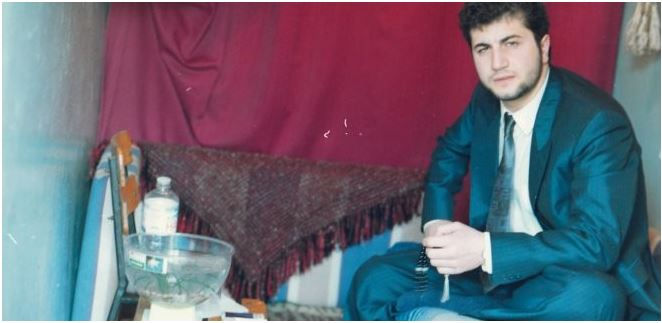
THE CONSERVATIVE BUSINESSMAN
These were his transformative years since after he got out of prison in 2014, he adopted a more violent, pro-AKP rhetoric. These were, in his words, years of normalizing Sedat Peker to the general public. Peker was heavily promoted as an altruistic businessman especially by the pro-government media and NGOs, at some point receiving the title of Khan of Turanism in an event organized by the Ministry of Culture and Tourism. However, his remarks towards the Academics for Peace (Academics favouring a peaceful resolution to PKK terrorism) caused mass outrage as he promised to “Make them bleed in droves”. The academics weren’t seen as a threat by the public since they didn’t support separation. After this event Peker left the public sphere for a while as he was increasingly welcomed to the inner workings of the AKP government. Peker’s organization sent the Free Syrian Army and Syrian Turkmen groups thousands of bulletproof vests as well as armoured vehicles organized by SADAT, an NGO closely tied to AKP officials. Even though his organization was well connected, they weren’t the only ones to acquire important roles within the government as after the failed coup attempt in 2016, the Gulenists were purged from the government and the resulting vacuum of power attracted different groups. MHP, a far right ultra nationalist party with a long history but with a low voter base in Turkey, which was a harsh critic of the government until that point, became their coalition partners. Berat Albayrak, Erdoğan’s son-in-law, became Minister of Energy and Natural Resources and Minister of Treasury and Finance respectively. His clique commonly referred to as the "Pelican Group" held important positions in government and especially in media. Suleyman Soylu, the Minister of the Interior (who is a controversial figure in Turkey because of the way he responds to protests, his harsh approach to war against terrorists as well as his inefficient and restrictive response to COVID-19), became extremely powerful since 2016 and Peker’s claims and accusations mostly date to this period.
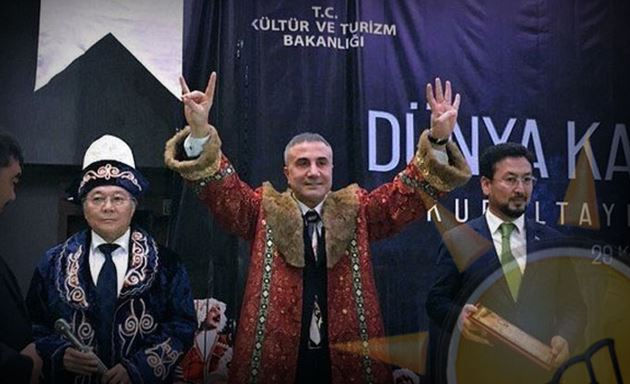
FROM MAFIOSO TO YOUTUBER
Peker left Turkey in 2020, claiming to be going to get a university education in Montenegro. The real reason he left was because he got wind that he was the target of a new investigation. Minister of the Interior Soylu was now targeting Peker. Although he was abroad, he claims his wife and daughter were mistreated during police raids. He was later target of an international investigation and lived the last year on the run from the Balkans to North Africa. Eventually settling in Dubai, Peker started releasing his videos because he claimed he wasn’t able to let go of the mistreatment of his family. Peker’s videos are full of seemingly shocking accusations, a revenge plot and a colourful presentation almost reminding of a stand up performance, mysterious objects and books. In the last couple of months, Peker’s weekly videos have become a huge hit in Turkey. In the videos he accused former Prime Minister's son of smuggling cocaine from Venezuela, which Binali Yıldırım responded by claiming that his son went to deliver masks and test kits (at the time there were 300 Covid-19 cases in Venezuela and 30,000 in Turkey). He also accused SADAT of providing arms to terror groups in Syria like Al-Nusra through his trucks without his information, claimed bribing former member of the Grand Nation Assembly, Metin Külünk, explained the alleged corruption scheme within municipalities, accused Tolga Ağar (son of the infamous Minister of Interior during the Susurluk Scandal) of rape and murder of journalist Yelda Kahraman and made many accusations of corruption against the powerful Minister of the Interior as well as admitting to having received a contract for the assassination of Turkish Cypriot journalist Kutlu Adalı, from the deep state in the 90’s. These are, for now, just allegations and accusations but serious ones nonetheless.
These claims would be shocking for most countries, but in Turkey such underground connections and widespread corruption had been normalized to such an extent that his accusations weren’t received by shock, but mostly as confirmation of open secrets people already suspected. “You will lose to a tripod, a camera and my mind” Peker commonly states in his videos, and so far he has managed to influence the internal politics as well as getting public’s attention. Still, it would be wrong to assume that Peker is doing all this in the name of honesty since he is the leader of an organized crime ring. In his 9th video, Peker explained his actions as a “lion hunt to redeem myself to my tribe” invoking the image of an anti-hero, along statements like “I am not here to be your Mesiah, I have my own business to sort out”. He combines this image of an anti-hero with textbook podcasting tricks to provide a captivating reality show to a public that was already highly distrustful of the government.
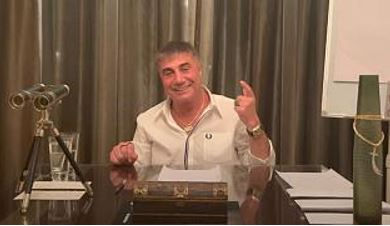
WHY NOW?
Although Peker claims he started releasing his videos due to the mistreatment of his family, the timing implies that there is more to it. The latest polls show that AKP-MHP alliance is in a downward trend and it is likely that they will lose the next election. With diminishing popularity as well as power, many journalists claim that the cliques within the ruling alliance are in a tug of war and this provided Peker the opportunity to turn against AKP and redeem himself to the next possible administration. Even his nationalist rhetoric started to include some left wing statement as he started quoting Alawite thought leaders and leftist poets. However, another possibility is that he wants to acquire informant status to the Interpol in order to avoid extradition since he made accusations towards arms and drug trafficking as well as stating that he is studying international law. Yet, he has refrained from making accusations against Erdoğan. Although he says he wouldn’t want to put “Brother Tayyip” and Turkey in a tough position in the upcoming NATO Summit, some think it’s the last attempt at safety in the case of an AKP victory in the next general elections or capture. Whatever his goals are, he is exposing the state of corruption within the government and strategically releasing proof of his accusations. The fact that he was a beloved and influential figure in nationalist cycles makes the latest developments all the more significant. Time will tell if Peker’s accusations will be investigated, however every attempt to do so in the Grand National Assembly have been blocked by AKP-MHP votes so far, but with an election looming within the next two years, the people are increasingly remembering the days when AKP emerged as a harsh critic of corruption and underground organizations. They had presented themselves as an alternative to a corrupt state structure but due to the exposed nature of alleged widespread corruption, the ruling alliance is starting to lose their grip on power, as people think maybe its time for a change in the government.
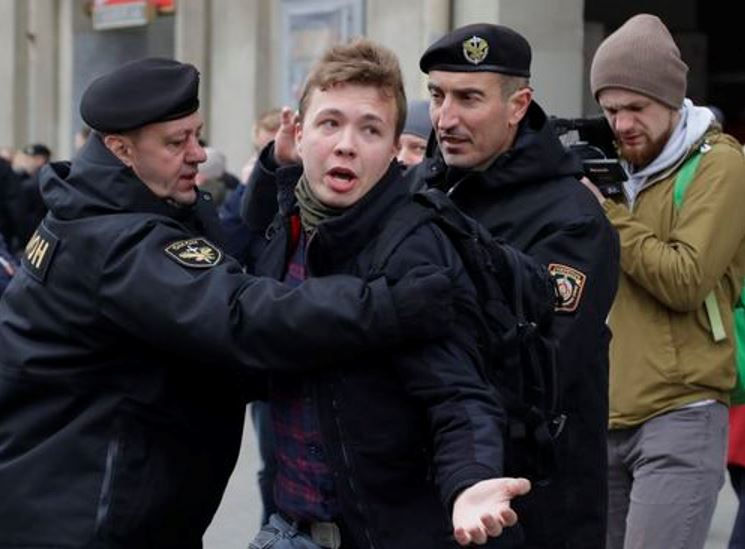

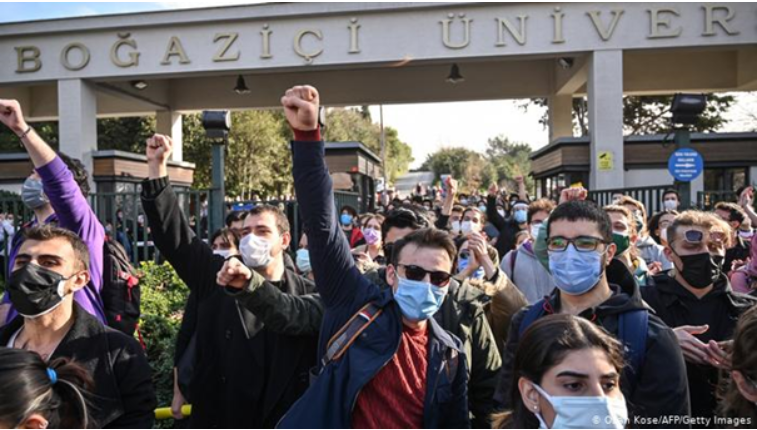
Comments